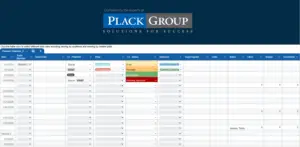Before getting a bank loan, figure out how much money you need. You might need a loan to expand to a new location. You’ll need to look at all the possible expenses involved: land acquisition or construction costs, cost of renovating a new space, costs of furniture, equipment, and inventory. There will be moving costs and start-up costs.
A portion of the costs will have to be self-funded, so calculate how much you can afford to pay yourself.
So, subtract your funding from the total costs, and you have approximately how much you’ll need to borrow.
Here comes the real number crunching: the next step in getting a bank loan is to create projections for how to use the financing and when you expect to repay the loan. If your business plan is a relic from your start-up days, now is a good time to update it. The more accurate and detailed your business plan, the more likely it is that lenders will give you a loan.
The fun part is filling out all of the paperwork that goes along with applying for a loan. There’s the personal resume, personal financial statement, collateral listing, cash flow forecast, and the loan application itself to fill out. There will be additional forms; this is not an exhaustive list of what you need to fill out.
Finally, you can talk to a lender. Talk to your accountant, attorney, or the SBA to find a list of qualified area lenders. Be professional and enthusiastic to the banker you speak with. He or she will represent your loan to the rest of the bank. It is very important to make a good impression.
The banker will likely request additional information. Get this information back as soon as possible–information received much later reflects disorganization and chaos.
After submitting all of your information, talking to a lender, and providing any additional information, the bank will review your application. The process could take several days or more than a month.
Lastly, a word about SBA loans. SBA loans can be a great option. These are commercial bank loans, meaning banks loan money to small businesses, while the SBA guarantees up to 90% of the loan. This may make banks more lenient on loan terms and/or collateral requirement. If this sounds too good to be true, know that the catch is that you must use an SBA lender, not just any bank.
For more information, call us at (410) 893-9100 or contact us!
This posting is intended to provide generalized information that is appropriate in certain situations. It is not intended or written to be used, and it cannot be used by the recipient, for the purpose of avoiding federal tax penalties that may be imposed on any taxpayer. The contents of this posting should not be acted upon without specific professional guidance. Please call us if you have questions.



